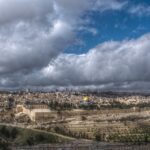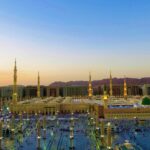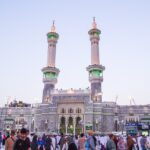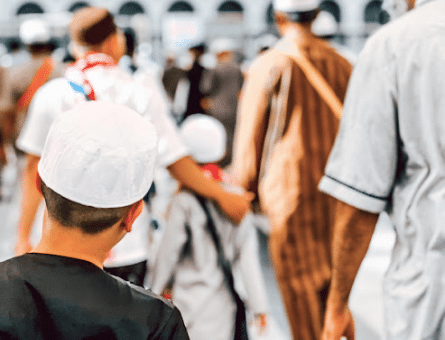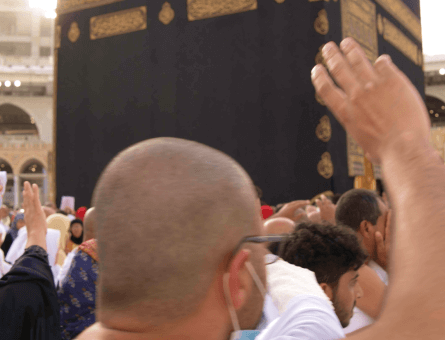Mount Arafah – Jabal ar-Rahmah – Facts and Significance in Islam
Also known as Jabal ar-Rahmah, Mount Arafah is located in the southeast of Makkah, Saudi Arabia. On the 9th of Dhul Hijjah, Muslim pilgrims leave Mina for Mount Arafah, where they stand and perform a contemplative vigil, recite the Quran, supplicate to Allah SWT, seek His forgiveness and remember Him. Mount Arafah is where the beloved Prophet Muhammad PBUH delivered the last sermon to the Muslims who accompanied him for the Farewell Pilgrimage towards the end of his life. Read on to learn more about Mount Arafah and its significance in Islam.
What Is Mount Arafah, Otherwise Known as Jabal Arafah?
 The literal meaning of the word Arafah is “to know.” Based on Islamic history, it is believed that after being taken out of Jannah and placed back on Earth, it was Mount Arafah where Prophet Adam (AS) and Hawa (AS) reunited. Mount Arafat is commonly known as Jabal Arafah, which means the “Mountain of Mercy.” Moreover, it is the place where Prophet Muhammad PBUH stood and delivered the Last Sermon, also known as Khutbah al-Wada, to his companions and all Muslim pilgrims who accompanied him on the Hajjat ul-Wada.
The literal meaning of the word Arafah is “to know.” Based on Islamic history, it is believed that after being taken out of Jannah and placed back on Earth, it was Mount Arafah where Prophet Adam (AS) and Hawa (AS) reunited. Mount Arafat is commonly known as Jabal Arafah, which means the “Mountain of Mercy.” Moreover, it is the place where Prophet Muhammad PBUH stood and delivered the Last Sermon, also known as Khutbah al-Wada, to his companions and all Muslim pilgrims who accompanied him on the Hajjat ul-Wada.
Where Is Mount Arafah Located?
Mount Arafat is located on the plains of Arafah, about 20 kilometers in the southeast of Makkah, Saudi Arabia. To be exact, it is situated between Taif and Makkah, at a distance of 10 kilometers from Mina, 6 kilometers from Muzdalifah and 22 kilometers from Makkah.
Arafah and Hajj
The plains of Arafah behold special significance during Hajj. Walking towards the plains of Arafah and standing on it, staying there, and praying is an essential part of Hajj; as said by Prophet Muhammad PBUH, “Hajj is Arafat.” [Al-Hakim, al-Mustadrak] This means that whoever skips the part of standing on the plains of Arafah, they miss Hajj. Note: if a pilgrim did not stand on the mountain but did indeed stand on anywhere on the plains of Arafah, their Hajj will be accepted
On the 9th day of Dhul Hijjah, also known as the Day of Arafah, the pilgrims leave Mina for Mount Arafah. The last sermon (khutbah) is then delivered from Masjid al-Namirah, and Dhuhrain, the combinational prayer of Dhuhr and Asr is prayed together by the pilgrims on the plains of Arafah. Later the pilgrims spend the entire day on Mount Arafat, invoking Allah SWT to forgive their sins.
The Prophet Muhammad (PBUH) narrated, “There is no day on which Allah SWT frees people from the Fire more so than on the day of ‘Arafah. He comes close to those (people standing on ‘Arafah), and then He revels before His Angels saying, “What are these people seeking.”(Muslim)
What Happens in Arafah?
On Arafah, Muslim pilgrims spend their day making Dua. They combine the Dhuhr and Asr prayers and stand until sunset, facing the Qibla, seeking forgiveness and requesting Allah SWT to shower his blessings over them.
It is said that on the day of Arafah, Allah SWT descends to the sky and says to the angels, “My slaves have come to Me, rough and disheveled, coming from every distant valley hoping for My mercy, so if your sins were equivalent to the amount of a grain of sand or a drop of rain or like the foam on the sea I will forgive them. So go forth My slaves! Having forgiveness and for what or who you have interceded for.” [Tabarani]
What Is the Significance of Arafah in Islam?
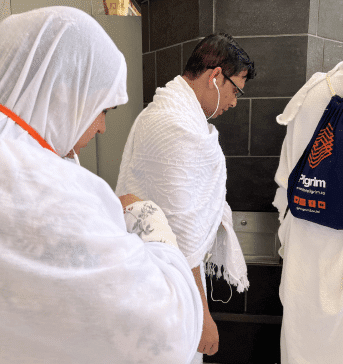 Reaching Arafah provides pilgrims with the deepest feeling of satisfaction with relation to Hajj. Not only is it the only ritual of Hajj that is performed outside the boundaries of the Sacred Kaaba, it is also known as the place where all prayers will be heard and fulfilled by Allah SWT.
Reaching Arafah provides pilgrims with the deepest feeling of satisfaction with relation to Hajj. Not only is it the only ritual of Hajj that is performed outside the boundaries of the Sacred Kaaba, it is also known as the place where all prayers will be heard and fulfilled by Allah SWT.
Aisha (RA) narrated that Prophet Muhammad PBUH, when asked about the importance of the day of Arafah, said, “There is no day in which Allah SWT sets free more souls from the fire of hell than on the day of Arafat. And on that day Allah SWT draws near to the earth and by way of exhibiting His Pride remarks to the angels, ‘What is the desire of these (servants of mine)?'” [Muslim]
Dua on the Day of Arafah
According to the Islamic traditions, Arafah is a special place for Dua (supplication) as Prophet Ibrahim (AS) and Prophet Muhammad PBUH made Dua at this very spot. The virtue of this place is asking from Allah SWT, and His response is promised. Therefore, it is advised that when praying at Arafah, a pilgrim’s heart should be pure and filled with nothing but neediness. One should thank Allah SWT for all the blessings and ask for his forgiveness. The Dua to be recited on the day of Arafah is as follows:
“Laa ilaaha ill-allaahu, waḥdahu laa shareeka lah, lahul-mulku wa lahul-ḥamdu, wa huwa ‛alaa kulli shay’in qadeer”
Prophet Muhammad PBUH said: “The best invocation on the day of Arafah, and the best of all the invocations I ever offered or other holy Prophets before me ever offered is: “There is no god but Allah: He is Unique; He has no partner, the whole universe is for Him and for Him is the praise, and He has power over all things.”[Tirmidhi]
In another place, Prophet Muhammad PBUH said, “Apart from the day of the Battle of Badr there is no day on which the Shaitan is seen to be more humiliated, more rejected, more depressed and more infuriated, than on the day of Arafah, and indeed all this is only because of beholding the abundance of descending mercy (on the day) and Allah’s SWT forgiveness of the great sins of the servants.” [Mishkat]
Fasting on Arafah
 According to the teachings of Islamic traditions, it is believed that fasting on the day of Arafah expiates the sins of the past and the coming years. This can be illustrated by a narration of Abu Qatadah, who said that a man asked Prophet Muhammad PBUH, “O Messenger of Allah, what do you think of fasting on the day of Arafat?” To which the beloved Prophet Muhammad PBUH replied: “It expiates the sins of the previous year and of the coming year.”[Muslim]
According to the teachings of Islamic traditions, it is believed that fasting on the day of Arafah expiates the sins of the past and the coming years. This can be illustrated by a narration of Abu Qatadah, who said that a man asked Prophet Muhammad PBUH, “O Messenger of Allah, what do you think of fasting on the day of Arafat?” To which the beloved Prophet Muhammad PBUH replied: “It expiates the sins of the previous year and of the coming year.”[Muslim]
Fasting on the day of Arafah is considered mustahab (desirable) for those who are not participating in Hajj. For pilgrims, it is not a Sunnah because Prophet Muhammad PBUH did not fast on this day during the Farewell Pilgrimage.
The people of knowledge consider it recommended to fast on the Day of Arafah, except for those at ‘Arafah’. [Tirmidhi]
Facts about Mount Arafah
Here are some little-known facts about Mount Arafah:
Fact 1 -Who Named Mount Arafah?
There are several stories associated with the name of Mount Arafah. Some say it was where Prophet Adam (AS) and Hawa (AS) met on Earth after being sent from heaven. While others say that Mount Arafah was the place where Angel Gabriel (AS) was teaching Prophet Ibrahim (AS) the scenes and rites, floating around him on the sacred mountain, telling him to repeat the words “I knew, I Knew.” However, Prophet Ibrahim (AS) kept on saying, “I know, I know,” which in Arabic is pronounced as Arafah.
Fact 2: It Is Where the Religion of Islam Was Perfected
On 9th Dhul Hijjah, Allah SWT perfected the religion of Islam. Mount Arafah was the place where the following verses were revealed: “Today I have perfected for you your religion and completed upon you My blessing, and I have chosen for you Islam as (your) religion.” [Holy Quran 5:3]
Umar (RA) later clarified this by stating, “We surely know that day and the place where it was revealed upon the Prophet Muhammad PBUH. He was standing at ‘Arafah on a Friday.’” [Bukhari]
Fact 3: It Is the Place of Immense Forgiveness
Prophet Muhammad PBUH said, “There is no day on which Allah SWT frees people from the Fire more so than on the Day of Arafah. Indeed, He draws near and then boasts of them to the angels then says, “What do they want?” [Muslim]
Therefore, it would be a wasted opportunity if a pilgrim spends their day on Arafah without asking for forgiveness and the blessings of Allah SWT.
Summary – Mount Arafah
Mount Arafah is a granite hill located at the southeastern side of Makkah. It is the place where Prophet Muhammad PBUH delivered the Last Sermon. Mount Arafah holds great value in Islamic history and culture and standing on the Mount or atleast the plains of Arafah is an essential part of Hajj.
Explore The New Pilgrim App
The Ultimate App
for Hajj and Umrah!






